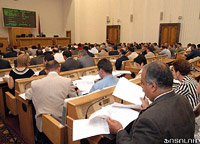“I am far from the thought that Armenia is a classical democratic country. But when we take a look at Turkey we understand that Turkey is a classical example of dictatorship,” said the deputy-chair of the NA, member of the ARF board, Vahan Hovhannisyan during the parliamentary hearing on Armenia-Turkey relations.
“During these years the approach of Turkey to Armenia has been diagonally opposing. Turkey offers to regulate all the issues of the past, receive satisfactory answers and only after that establish diplomatic relations and open the border. This means that Turkey sets certain pre-conditions in the relations with Armenia. But Armenia doesn’t have any pre-conditions,” in his turn said Vardan Oskanyan, Armenia’s Foreign Affairs Minister. Yesterday hearing mainly related to the membership of Turkey to the EU and Armenian-Turkish relations. Both NA Speaker Tigran Torosyan and Armenia FM Oskanyan expressed positive attitude to Turkey’s accession to the EU. In that case the border of the EU will reach our border virtually. “However it is desirable that Turkey becomes a full member of the EU after it conforms to all the EU standards,” said Torosyan. “I think, for us it is a great chance economically and politically, and in all aspects. Our worry is whether the decision of the EU will be fair, like that for the others, or Turkey will make a political decision on Turkey’s membership. This is our major concern, because we have bitter experience. If the process of membership of Turkey is launched, Turkey already had an advantage over its predecessors, and Turkey was allowed to launch this process with a bad state of human rights, absence of borders with Armenia. This is our concern,” Vardan Oskanyan says. When speaking of this matter the Armenian officials all unanimously claimed that Turkey must open the Armenian border without any pre-conditions. And there are three pre-conditions – regulation of the NKR conflict or at least retrieval of the neighboring territories of NKR back to Azerbaijan, recognition of the current boundaries of Turkey and refusing the Armenian Genocide. According to Oskanyan the conflict of the NKR is only the issue of Karabakh and Azerbaijan and Turkey cannot become a side of a conflict because it is not internationally accepted. The second pre-condition is that Armenia must stop pushing for the international recognition of the Armenian Genocide. In this case Oskanyan is sure that this is the moral debt of Armenia to raise this issue. As of the third pre-conditions (Armenia’s recognition of Turkey’s territories) Oskanyan says that for us the Treaties of Moscow and Kars, signed in the beginning of the 20th century, still remains acting for us. “We have inherited that from the Soviet era. If those treaties were not refuted or if the new ones have not been adopted it means that the old ones are still acting. This means that Turkey has rudely violated the terms of the treaty. Those treaties clearly outline the boundaries of Turkey and Armenia,” said Oskanyan. However, NA deputy-chairman Vahan Hovhannisyan finds the Kars Treaty illegal. It turns out that one of the top officials of Armenia relies on the Kars Treaty, the other one denies it. The Armenian side says the proposals extended to the sides of the Karabakh conflict after the OSCE ministerial meeting in Madrid are based on the right for self-determination of Karabakh, while the Azerbaijani side claims it is the right of self-determination within Azerbaijan. In a news conference on December 18 the Armenian reporters asked the Armenian foreign minister Vardan Oskanyan whose statements might be true. The minister did not answer this question but he said the stance of the Azerbaijani side might be a good wish, but they should not predetermine how the people of Karabakh should self-determinate before this self-determination. In his speech Hovhannisyan mentioned the demands presented to Turkey and the reimbursement, which Armenia should receive after the recognition of the Genocide. When raising the issue of the Genocide the RA government officials have never expressed a state standpoint about the reimbursement conditions. Yesterday discussion hosted representatives from numerous local and international organizations. Also, representatives were invited from Turkey but they didn’t show up. Specialist of Turkish Studies Ruben Safrastyan thinks that perhaps that is the reason why that country so anxiously treats the recognition of the Genocide. It is not excluded that Turkey may recognize the Genocide if the Armenian side refuses the reimbursement. And independent expert Ara Papyan thinks that Turkey will never recognize the Genocide. It’s just Armenia must discuss this issue in international courts. The current government finds it a priority issue to discuss the genocide but it seems that this issue is never conveyed into a legal ground. “I don’t see an intention like that,” Papyan says.

